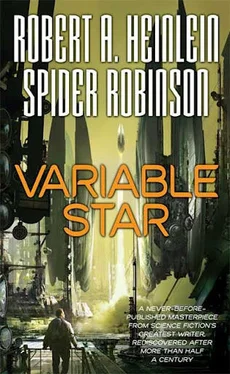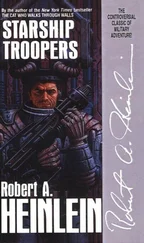• Conduct. Assuming an orchestra of some kind could be assembled out of five hundred people, and made good enough to be listened to by the rest.
Again: Did I possess whatever variant offshoot of charisma it was that would make musicians find watching me more helpful than listening to their own internal metronome?
• Act. An orchestra might prove to be beyond the resources at hand, but surely a theater company or trideo studio would form sooner or later.
Let’s just keep assuming the unanswerable question, “But did I have a particle of talent for that endeavor?” from here on.
• Direct, for either live or canned drama.
• Write, either live, canned, or prose fiction. Or nonfiction if necessary; I’d been given to understand that it did not pay a writer to be too fussy. Just possibly journalism, if it turned out that a town of five hundred souls produced enough gossip to need writing down. Herb could give me pointers.
And finally, of course:
• Play the furshlugginer saxophone. There were other venues aboard offering dining or entertainment or dancing. If I could line up enough different sorts of gigs, in different musical genres, then between that and private parties it might just be possible to make a whole entire livelihood out of my single favorite activity, pushing air out the end of a pipe.
That, God damn it, was finally something I did know I had the talent for. The crucial question however was: Did anybody care? Or rather, did enough people care that I would be able to live on my tips?
I looked back over my list gloomily, and detected a pattern. All the occupations that interested me shared two characteristics: they all might just manage to sustain me during the two decades of the voyage… and they would all become nearly worthless when we reached Immega 714. Pioneers don’t have a lot of time or energy for art, either making it or consuming it. It was unlikely that anybody would be willing to feed me just because I made a pretty noise, or made up stories, or pretended to be someone more interesting.
But what did it matter? Doubtless I would end up scratching so hard to feed myself and get warm and dry that most of those things would lose their appeal for me, too.
I brooded about it for the rest of the evening without useful result. I was about to collapse my keypad for the night when I noticed that I had incoming mail. That was odd. Practically everyone I knew lived in my room. Surely my Relativist acquaintances were all too busy for chat. Then I saw the header title, “Where are you?” and felt my pulse begin to rise as I leaped to the conclusion that it was from Jinny.
But no. Instead, it was from the Zog. My job search was over, at least for a while. Reality had caught up to me.
I wrote back that I would report at the start of shift next morning, at 0900. Then I went directly to bed and immediately to sleep, determined to be at his office no later than 0800.
I had formally reported to the Zog back on the morning of my second day aboard the Sheffield —but found now that I had almost no memory of the event, or the man. Indeed, I had very little recall of anything that had happened that day, or for that matter any of those last days we’d spent in Terran orbit. This was not surprising, for two reasons.
First, it turns out to be oddly difficult to make a human brain remember events that occurred in free fall: the sleeping brain, which does the filing, insists on treating such experiences as dreams. The phenomenon wears off after a few weeks of zero gee, but we hadn’t hung around in orbit that long.
And second, I had spent that whole period in a mental-emotional state approaching fugue—the sort of zombie numbness one must maintain during the process of sawing off the trapped limb. The Zog must have taken one look at me and realized I would be useless until we left the Oort Cloud.
With that symbolic cutting-of-the-cord, and the colossal bender with which I had marked it, and finally my musical catharsis with silver Anna at the Horn of Plenty, I had finally snapped out of my funk, rebooted my brain—just that day, really.
And several decks away, a man who had seen my vacant face exactly once, for less than a minute, had sniffed the air that morning and somehow sensed that I had finally germinated, and was ready to plant. That’s the Zog for you.
Kamal Zogby was a Marsman who made you think of Martians. He didn’t have three legs—as far as I know—but he was unreasonably tall and thin, even for a Marsman, and bowlegged, and slow moving unless he was in a blurring hurry, and he had an almost Martian distaste for sitting down or any posture but bolt upright. Also he was as taciturn as a Martian, with a similar sort of gravitas, and sometimes could be almost as hard to read. And like a Martian, the Zog never needed to look anything up.
But no Martian ever had a nose like that great ice-axe Lebanese honker of his—or many humans, for that matter. Nor did Martians have teeth anywhere near that big and white and frequently displayed. And he was unlike any Martian ever hatched in two important ways that made it possible to work for him. He genuinely cared about everybody he ever met, found them interesting. And he had a strong and subtle sense of humor.
He was not a botanist, or an agronomist, or a plant physiologist, or a hydroponicist, or an anythingist, really—not on paper, anyway. He had no degrees at all. He was just the Straw Boss.
Back on Mars, literally dirt poor, he had once kept a whole dometown in food, water, and air for twenty years after a catastrophic ecocollapse nearly wiped them out. They said if a thing could be grown, under any circumstances, he could grow it hydroponically. He could grow lemon trees hydroponically, or succulents, or even fungi.
And in theory we might even have managed to survive a hypothetical total failure of the hydroponic farm—because with part of his time the Zog also oversaw an experimental two-hectare half-meter-deep dirt farm that took up an entire deck, just above the Hydroponics Deck. It attempted to mimic the conditions we expected to find on our new home-to-be, Brasil Novo, second planet of Immega 714. The hope was that by the time we got there, we would know as much about how to dirt farm there as we knew about hydroponics now. And meanwhile, if something ever went horribly wrong down on the Hydroponics Deck, two hectares of land were just barely enough to feed five hundred people. In theory.
Finding the Zog’s office, down on the Voyage Farm Deck, was easy. Gaining access was even easier, even though I had arrived well before the beginning of shift as planned. There was no execassist or persec or even door sentinel program to run interference for him. There was no door . Just an open doorway beneath a sign that read “Straw Boss.” Unfortunately, there was no Zog on the other side of it either. Or anyone else; the office was empty. I waited expectantly for his desk to tell me where he was, or at least when he would arrive, but it didn’t. So I told my own doppleganger to consult the ship system and locate him. After a noticeable hesitation, the ship politely declined to cooperate: the Zog was delisted. If he had a schedule on file it was not public. The ship declined to make an appointment in his name. It advised me to either take my chances and wait, or leave a message for him and go do something else.
I didn’t much like either alternative. Especially after looking around the office: my strong impression was that he dropped by there once or twice a week at best. So I decided to hunt around for him.
The choices were a) this, the hydroponic Voyage Farm Deck, or b) the dirt-based Destination Farm Deck immediately above it. The choice kind of made itself.
The hydroponic farm operation was as intricately choreographed, complexly layered, and densely packed as any terrestrial jungle, with trays of assorted growing things stacked up to four high in places on frail-looking frames, and a bewildering variety of different lighting, watering, drainage and airflow systems, each tailored to a different variety of crops. The longest uninterrupted sight line on that deck was about three meters—and the lighting was so weird, with LEDs, metal halides, and sodium bulbs of assorted colors and intensities competing and clashing in odd ways at different places that you wouldn’t have wanted to see much farther than a few meters in any direction anyway. The air circulation was so intense, in order to carry away the heat from all those lights, that there was a constant wash of white noise muffling all other sounds.
Читать дальше










